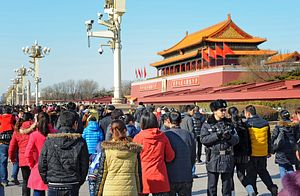After enjoying rapid development for nearly 40 years, China is at a turning point in terms of both economic growth and social development. In this series, Dr. Xue Li examines the five most critical challenges and potential pitfalls China faces today. See his previous pieces on Pitfall #1 and Pitfall #2 as well.
China lacks core values – values that are widely believed in by both officials and the people and reflected in their actions. Core values can also be understood as a system of cultural and political beliefs.
In place of core values, we see the ‘religion’ of worshiping money and material things widely manifested in China. As an example, when Chinese people make pilgrimages to temples throughout the country, they often throw coins to supplement their requests. We see piles of coins on the back of dragons, on the feet of Buddha, and thrown into pools. These sparkling coins are reflected in popular sayings such as “If you have money you can gets ghosts to act” and “Celestial beings can also be bribed.”
It is understandable that such a phenomenon might appear at a certain stage in the commodity economy, but it is not normal. It reflects the lack of religious belief among the people and the rule of the religion of worship of money and material things superimposed on the pragmatic psychology of the Chinese people.
Core values go beyond religion, of course – they reflect the cultural characteristics of a group of people. These are the sources of the group’s cohesiveness. Politically, core values are the source of the state identity. For a multiethnic state, this has political implications: the absence of support for a set of core values will affect the stability and even existence of the state. Such a state would lack a solid foundation for its development and rise. Therefore, establishing a shared system of cultural and political beliefs is a fundamental problem that China needs to solve.
Thanks to this lack of core values, there are two social and cultural phenomena worthy of note in China today. The first is that people have a general feeling of dissatisfaction. No matter whether we are talking about leftists, moderates, or rightists; activists, advocates of the status quo, or conservatives; high-ranking cadres, mid-level leaders, grassroots cadres; the wealthy, the middle class, or the poor – nearly everyone is dissatisfied with the present state of society and with their own personal situation. Many people even hate the rich and hate officials.
The second phenomenon is a general feeling of insecurity. Officials, owners of small and medium sized enterprises, scholars – especially those intellectuals in the humanities and in the social sciences – workers, migrant workers, and peasants all feel insecure, though for different reasons. Some feel insecure about their property, some about their official position, and some because of the views that they have expressed and still others because of their health insurance. Still others feel insecure about the prospects for their businesses, and others feel insecure about their right to reside in a big city and the related problem of their children’s right to an education in that city. Some feel insecure about their lands, which they have cultivation rights to under the contract responsibility system.
How do people handle this insecurity? Some officials or wealthy businessmen transfer their property and send their wives and children abroad. Some entrepreneurs register their companies outside the mainland. Some peasants focus on maximizing their short-term gains by exploiting the land that they work under the contract responsibility system. These are all manifestations of feelings of insecurity, and most people are familiar with these issues.
What few people understand are the insecurities of the middle class in China’s big cities, especially in Beijing and Shanghai. Typically, these people have been working hard in the big city for ten-odd years; they have a home and children. They no longer fit in to their old homes in the countryside. They have already become city people – except for the problem of city resident household registration (a hukou). Suddenly one day they find that their child, because of the hukou problem, can’t get into a good local primary school or lower middle school. Even worse, their child can’t attend a local high school and so must return to their old home to take the high school entrance examination.
These families face a difficult choice: they can give up their jobs in the city and have the whole family return to their former home for several years; the husband and wife can live apart while one returns to their former residence with the child; or they can send the child back to their former home, alone, to study. The alternative is for the child to settle for a mediocre high school in the city and then takes the examination for a technical vocational school, giving up on higher education. Any choice they make will have serious consequences.
These families feel deeply conflicted. You can just imagine the dissatisfaction; the feelings of insecurity and even anger that this leads to. These people are relatively small in number, but they are symbolic. They are the touchstone of China’s urbanization and the foundation of China’s social stability.
This level of dissatisfaction and insecurity did not exist in the 1980s. These issues became apparent in the 1990s and have now become serious. This means that China’s society has become sick and needs treatment. Many people say that these are development problems – they arise during a period of development and can only be solved by further economic growth. But the issue of core values will not be fixed by economic development.
Dr. Xue Li is Director of the Department of International Strategy at the Institute of World Economics and Politics, Chinese Academy of Social Sciences. Translation courtesy of Gao Dawei.

































